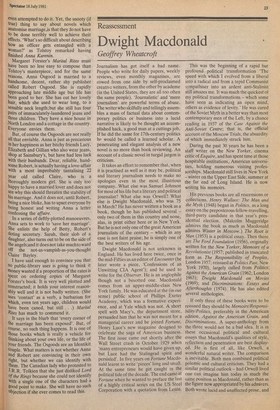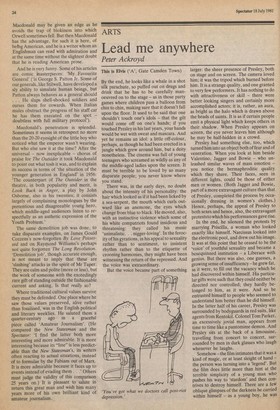Reassessment
Dwight Macdonald
Geoffrey Wheatcroft
Journalism has got itself a bad name. People who write for daily papers, weekly reviews, even monthly magazines, are cowed from one side by self-proclaimed creative writers, from the other by academe (in the United States, they are all too often the same people). 'Journalistic' and 'mere journalism' are powerful terms of abuse. The writer who skilfully and tellingly assembles a mass of factual data about contemporary politics or business into a lucid narrative is likely to be thought an accomplished hack, a good man at a cuttings job. If he did the same for 17th-century politics he would be called a learned scholar. A penetrating and elegant analysis of a new novel is no more than book reviewing. An account of a classic novel in turgid jargon is criticism.
It takes an effort to remember that, when it is practised as well as it may be, political and literary journalism needs to make no apologies even in the most illustrious company. What else was Samuel Johnson for most of his life but a literary and political journalist? What else was Orwell? What else is Dwight Macdonald, who was 75 in March? He has never written a book as a book, though he has published several — only two of them in this country and none, alas, in print either here or in New York. But he is not only one of the great American journalists of the century — which in any case is not faint praise; he is simply one of the best writers of his age.
Dwight Macdonald is not unknown in England. He has lived here twice, once in the mid-Fifties as an editor of Encounter (he later wrote a piece, 'Confessions of an Unwitting CIA Agent'); and he used to write for the Observer. He is an anglophile though not a besotted one. Macdonald comes from an upper-middle-class New York family. He was educated at the (in our sense) public school of Phillips .Exeter Academy, which was a formative experience, and at Yale which was not. A short spell with Macy's, the department store, persuaded him that he was not meant for a managerial career and he joined Fortune, Henry Luce's new magazine designed to celebrate the saga of American business. The first issue came out shortly after the Wall Street crash in October 1929 when 'many entrepreneurs would have given up, but Luce had the Stalingrad spirit and persised'. In five years on Fortune Macdonald learnt to write 'pieces' long and small. At the same time he got caught in the political tide of the decade. The end came at Fortune when he wanted to preface the last of a highly critical series on the US Steel Corporation with a quotation from Lenin. This was the beginning of a rapid but profound political transformation 'The speed with which I evolved from a liberal into a radical and from a tepid Communist sympathiser into an ardent anti-Stalinist still amazes me. It was much the quickest of my political transformations — which some have seen as indicating an open mind, others as evidence of levity.' He was cured of the Soviet Myth in a better way than most contemporary men of the Left, by a chance reading in 1937 of the Case Against the Anti-Soviet Centre; that is, the official account of the Moscow Trials, the absurdity of which immediately struck him.
During the past 30 years he has been a staff writer on the New Yorker, cinema critic of Esquire, and has spent time at those hospitable institutions, American universities, holding numerous visiting professorships. Macdonald still lives in New York — winter on the Upper East Side, summer at the far end of Long Island. He is now writing his memoirs.
His previous books are all rescensions or collections. Henry Wallace: The Man and the Myth (1948) began in Politics, as a long essay on the preposterous fellow-travelling, third-party candidate in that year's presidential election. (Malcolm Muggeridge admires the book as much as Macdonald admires Winter in Moscow.) The Root is Man (1953) is a political essay. Then there are The Ford Foundation (1956), originally written for the New Yorker; Memoirs of a Revolutionist (1957; published in truncated form as The Responsibility of Peoples, London 1957; reissued as Politics Past, New York 1970), largely culled from Politics; Against the American Grain (1962; London 1963); Dwight Macdonald on Movies (1969); and Discriminations: Essays and Afterthoughts (1974). He has also edited several anthologies.
If only three of these books were to be reissued they should be Memoirs' Responsibilityl Politics, preferably in the American edition, Against the American Grain, and Discriminations. A super-anthology from the three would not be a bad idea. It is in these occasional political and cultural essays that Macdonald's qualities of style, reflection and penetration are best displayed. He is first of all, like Orwell, a wonderful natural writer. The comparison is inevitable. Both men combined political polemic and cultural criticism. They had a similar political outlook — had Orwell lived one can imagine him today in much the same position as Macdonald, rather than as the figure now appropriated by his admirers. Both wrote lucid and unaffected prose, and Macdonald may be given an edge as he avoids the trap of blokiness into which Orwell sometimes fell. But then Macdonald has the advantage, for such it is here, of befrig American, and he is a writer whom an Englishman can read with admiration and at the same time without the slightest doubt that he is reading American prose.
And he is very funny. Some of his articles are comic masterpieces: 'My Favourite General' ('is George S. Patton Jr. Some of our generals, like Stilwell, have developed a sly ability to simulate human beings, but Patton always behaves as a general should . . . He slaps shell-shocked soldiers and curses them for cowards. When Italian mules obstruct the progress of his staff car he has them executed on the spot — doubtless with full military protocol').
Macdonald's penetration is splendid. Sometimes it seems in retrospect no more than the 20-20 eyesight of the little boy who noticed what the emperor wasn't wearing. But who else saw it at the time? After the universal — now inexplicable — chorus of praise for The Outsider it took Macdonald to point out what tosh it was, and to explain its success in terms of 'the situation of the younger generation in England' in 1956: 'The counterpart of The Outsider in the theatre, in both popularity and merit, is Look Back in Anger, a play by John Osborne, also in his twenties; it consists largely of complaining monologues by the pretentious and disagreeable young hero, which middle-aged audiences listen to respectfully as an authetic expression of the Youth Problem.'
The same demolition job was done, to take disparate examples, on James Gould Cozzens's now-forgotten By Love Possessed and on Raymond Williams's perhaps not quite forgotten The Long Revolution. 'Demolition job', though accurate enough, is not meant to imply that these are 'slashing' attacks in the spirit of Mr Taper. They are calm and polite (more or less), but the work of someone with the exceedingly rare gift of standing outside the fashionable current and asking, Is that really so?
Where traditional cultural values survive they must be defended. One place where he saw those values preserved, alive rather than fossilised, was in the English political and literary weeklies. He saluted them a quarter-century ago in a graceful piece called 'Amateur Journalism'. (He compared the New Statesman and the Spectator: 'I find the latter both more interesting and more admirable. It is more interesting because its "line" is less predictable than the New Statesman's, its writers often reacting to actual situations, instead of to formulae by the Fabians out of Marx. It is more admirable because it faces up to events instead of evading them. . .' Others must judge the validity of this comparison 25 years on.) It is pleasant to salute in return this great man and wish him many years more of his own brilliant kind of amateur journalism.



































 Previous page
Previous page